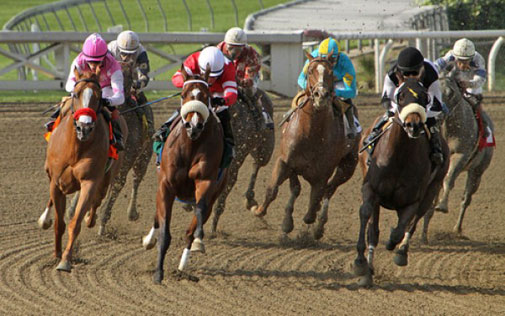
[TV WORTH WATCHING proudly presents a guest column by Ben Yagoda, an author, professor and old friend who once studied under David Milch at college -- and, obviously, learned a lot. - DB]
When HBO announced last week that it was cancelling the horseracing drama Luck because a third horse had been injured on the set and had to be euthanized, I had mixed emotions. Mostly sad, I hasten to say.
But the other part of the mix was the sort of not unsatisfying stirring of the feelings one associates with drama of a high order.
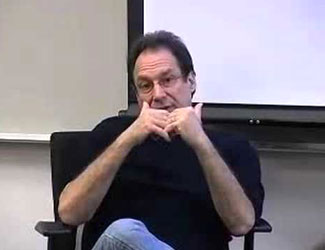
This all had to do with David Milch, the creator and writer of the series, whom I met in my first week of college in 1971, because he was assigned to be my adviser...
He quickly earned his keep on that score, by counseling me -- I think it would be more accurate to say "ordering me" -- to sign up for a section of freshman English with a man named Richard Sewell, who ended up being one of the best teachers I've ever had.
But most of the advice I got from Milch -- and there was a lot of it, I realize -- didn't have to do with school stuff.
This all was at Yale University in the early seventies. Milch -- in his late 20s at the time -- was on the faculty as a "lecturer," which I think meant he didn't have a PhD, or a prayer of getting tenure.
I am still not completely clear on how he got there, but it had something to do with his own undergraduate career at Yale, which was so academically outstanding that three of the eminences of a remarkably eminent English Department -- Cleanth Brooks, R.W., B. Lewis, and Robert Penn Warren, whom Milch always referred to as "Mr. Brooks," "Mr. Lewis" and "Mr. Warren" -- had arranged for a gig in which he worked on a new edition of one of their anthologies, taught a course called "Strategies of Indirection in Fiction," worked on his own fiction and screenplays, and bullshitted.
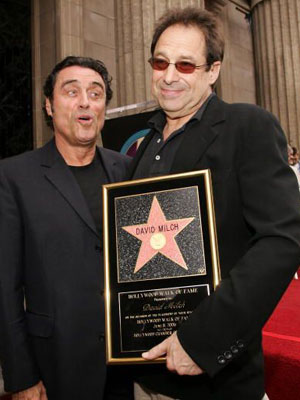
I use the term not to impugn the truth of his stories but to suggest their grandeur. Milch was the best storyteller I'd ever met. He is still the best storyteller I have ever met.
He had us gasping for breath with long shaggy-dog stories he said he picked up from Buddy Hackett "in Vegas." The punchline of one, which involved a parrot, was "It's the plumber!" Another, an extremely dirty joke that he stretched out to Faulknerian proportions, ended in his version with "The Sophisticates!" -- though a recent documentary about that joke gives an alternate punchline (it's also the title of the movie), The Aristocrats. I still like "The Sophisticates" better; sophisticates is a funny word.
He told stories about his own exploits -- including the time he got thrown out of Yale Law School, in which he had enrolled to escape the draft, for... well, I remember that he was shooting pigeons on a power line, but Wikipedia says that he destroyed a police car's siren with a shotgun. Take your pick.
He told great stories about cronies with whom he had associated in the off-off-Broadway theater world, people like Chuck Levin and Victor Bumbalo. Given that I can't remember what I had for breakfast yesterday, it's funny (and borderline weird, I admit it) that I have remembered the name "Victor Bumbalo" for 40 years. The name is so wonderful and Dickensian that I've suspected all this time there was no Victor Bumbalo.
But the ever-helpful Wikipedia tells me that he not only exists, but has had a distinguished career as a director and playwright (including contributions to Milch's NYPD Blue). I also remember the punchline to the Victor Bumbalo story: "And the cop says, 'Three miles an hour!'"
I think you can tell that Milch was an important person to me. I guess you could say he was my own Cleanth Brooks and Robert Penn Warren. I laughed at his stories in the dining hall, took "Strategies of Indirection in Fiction," and took seriously the role of advisee.
As I say, most of Milch's counsel didn't have to do with classes and majors. In addition to the comedy, he told me a lot of serious things that I still remember. One summer, I told him I'd gotten a job as a waiter. Knowing my propensity for shambling, he looked at me askance till he was sure I wasn't kidding. Then, knowing my then-propensity for irony, he said, "Be solicitous to the customers."
Solicitous is a good word. I tried to follow that advice -- in fact, I've tried to follow it ever since, even though I haven't interacted with customers since 1975.
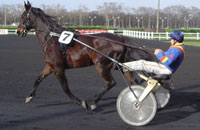
But I didn't always do what Milch told me. It might have been before I got the waiter job, or it may have been another summer, but at one point when I was jobless, Milch said, with a look on his face as if the brightest lightbulb had just gone off, "You live in New Rochelle. That's near Yonkers. You can work at Yonkers Raceway!"
I said the trotters weren't my bag, and he walked off shaking his head. He couldn't quite fathom the existence of a person to whom racing and the track weren't completely enthralling.
I didn't actually quite fathom at the time the extent to which they were enthralling to him. I knew he was working on a screenplay about horseracing. Legend had it -- and of course legends sprang up around Milch like mushrooms in the forest after a heavy rain -- that he had sold shares in the screenplay to pay off his own gambling debts, and indeed, that he had already sold something like 150 percent of the property, meaning that he would be better off never finishing it, which, to the best of my knowledge, has been the case.
Eventually, I graduated, and lost touch with Milch. One night in 1982 I was in my apartment in Hopewell, New Jersey, and turned on my newish color TV (I had bought it for the express purpose of watching Alec Guinness in Tinker Tailor Soldier Spy).
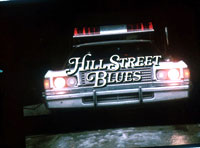
A show called Hill Street Blues came on, and prominently featured in the first scene was none other than Chuck Levin, Milch's old buddy, whom I had seen perform at the Yale Repertory Theater. I had a hunch. Sure enough, when the credits ran at the end, I saw the words "Teleplay by David Milch." I got a kick out of that, out of his eventual promotion to executive producer on the series, and out of seeing him accept the 1983 Emmy for Outstanding Writing in a Drama Series.
A few years later, I was out in L.A. on a writing assignment, and saw Milch on the other side of a restaurant. I walked over, and we caught up with each other for a minute. Then he introduced me to his lunch companion in roughly these words: "Mr. Yagoda, this is Mr. Wolf. Mr. Wolf, Mr. Yagoda." Solicitous, of course. Mr. Wolf was Dick Wolf, who I believe was at that time about to bring Law & Order to the small screen.
I saw Milch a few times after that. Once time he packed me and TV critics David Friedman and Monica Collins in his car (a compact, I recall) and brought us out to Santa Anita Racetrack. One of his horses was running, and he couldn't imagine anyone not wanting to see that. And, as a matter of fact, it was a great day.
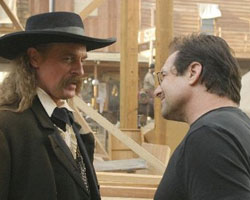
We eventually fell out of touch again, and I followed his career from afar: the triumphs like NYPD Blue and Deadwood, the not-so-triumphs like Capital News and John from Cincinnati.
When I read about HBO's Luck, my first thought was, "He's finally getting his horseracing screenplay produced!"
I don't know how much of that property made it into the series, but I have gotten yet another kick out of the show, especially the magnificent portrayal of Ace Bernstein by Dustin Hoffman, and the profoundly eccentric quartet of railbirds, brilliantly portrayed by actors some of whom, I bet, Milch has known for four decades-plus.
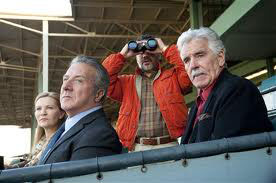
But, after this Sunday's first-season finale at 9 p.m. ET on HBO, no more Luck. No pun intended -- but that's the thing about the terrible news about the horses. It is so deeply ironic, that on some level it is almost beautiful.
Puns and other kinds of meaning adhere to it. It is larger, in a dramatic sense, than what you expect life to give you. It is the kind of thing that happens to David Milch, I guess. I imagine that he is aching right now, but I also imagine that one day he will transform the irony and the ache to bracingly original television.
I'll be tuning in.
--
Ben Yagoda teaches journalism at the University of Delaware and is author of About Town: The New Yorker and the World It Made, Memoir: A History and other books. He conributes to the Chronicle of Higher Education's Lingua Franca and conducts his own blog, Not One-Off Britishisms.